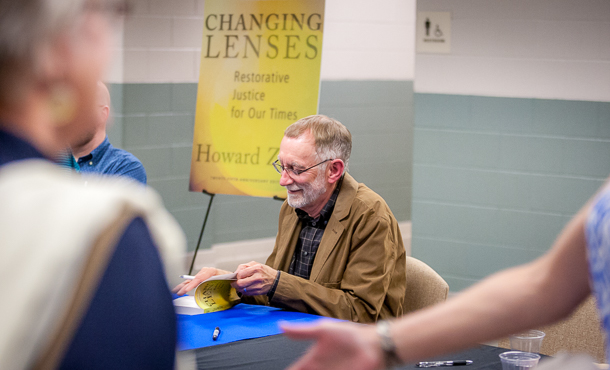When Howard Zehr, now a distinguished professor of restorative justice at Eastern Mennonite University’s Center for Justice and Peacebuilding (CJP), was working on his best-known book, Changing Lenses, in the late 1980s, he didn’t know if it would be taken seriously. The book proposed, after all, a radical shift in the way society understands and responds to crime – exchanging the traditional, punitive approach to justice for a restorative paradigm that focuses on meeting the needs of everyone affected by a particular crime.
“I really expected to kind of be laughed at,” recalls Zehr, who was director of Mennonite Central Committee’s Office of Crime and Justice and working as a freelance photographer at the time (he joined the EMU faculty in 1996).
Changing Lenses received little press or attention from reviewers after its publication in 1990; instead, Zehr says, it “became a word-of-mouth book” that passed from person to person. Along the way, and in great contrast to his early expectations, the book – a fourth edition was released in 2015 – became a seminal work in the restorative justice field.
To mark the 25th anniversary of Changing Lenses’ publication, the journal Restorative Justice: An International Journal released a special issue online and in print in December 2015. It included essays from five scholars and practitioners, who wrote about the book’s influence on their lives and professional environments.
“[Changing Lenses] has been a major stimulus to, and has had a profound influence upon, restorative justice as a field of study and practice,” wrote Gerry Johnstone, a professor of law at the University of Hull in England and the book review editor for Restorative Justice, in his introduction. “In publishing the symposium we hope to stimulate readers – especially those new to the field – to read (or reread) this classic text and engage with its ideas and arguments.”
In one of the essays, Kay Pranis, a Minnesota-based restorative justice practitioner and regular instructor at CJP, reflected on Changing Lenses’ ongoing significance to her field.
“In the U.S. restorative justice is a movement without a center. There is no central organizing authority to promote restorative justice, to establish standards, to define practice or to marshal resources,” she wrote. “It is a very decentralized movement. In spite of that I find it to be a remarkably coherent movement. In a movement without a national center, Changing Lenses has been a primary centering force.”
Zehr also contributed a reflection to the special issue of Restorative Justice, writing that he was “deeply honored, of course, by the attention to the book in this issue, and the kind things the authors have to say.”
In addition to Pranis, the following scholars also contributed essays to the issue:
- Jacques Faget, University of Bordeaux, France;
- Christopher Marshall, Victoria University of Wellington, New Zealand;
- Brenda Morrison, Simon Fraser University, Canada;
- Thomas Trenczek, Ernst Abbe University of Applied Sciences Jena, Germany;
Looking back, Zehr believes that the book’s accessible, non-academic language and broad spiritual appeal were important pieces of its success. In conversations with readers over the years, and as he watched others apply restorative justice principles in schools and in other innovative ways, Zehr also came to realize that the values that Changing Lenses specifically envisioned for a criminal justice system have far broader application. Accordingly, some years ago, he published on his blog a list of “Ten Ways to Live Restoratively.”
One of the entries on that list cautions against “imposing our ‘truths’ and views on other people and situations” – a theme to which Zehr returned at the end of his essay just published in the special edition of Restorative Justice:
“To those of us who advocate restorative justice: at least in our own lives and messages … May we propose, not impose. May we listen as much or more than we speak.”
Read about Professor Howard Zehr’s retirement “roast,” which celebrated the 25th anniversary of Changing Lenses here. Zehr now co-directs the Zehr Institute for Restorative Justice with Carl Stauffer.
